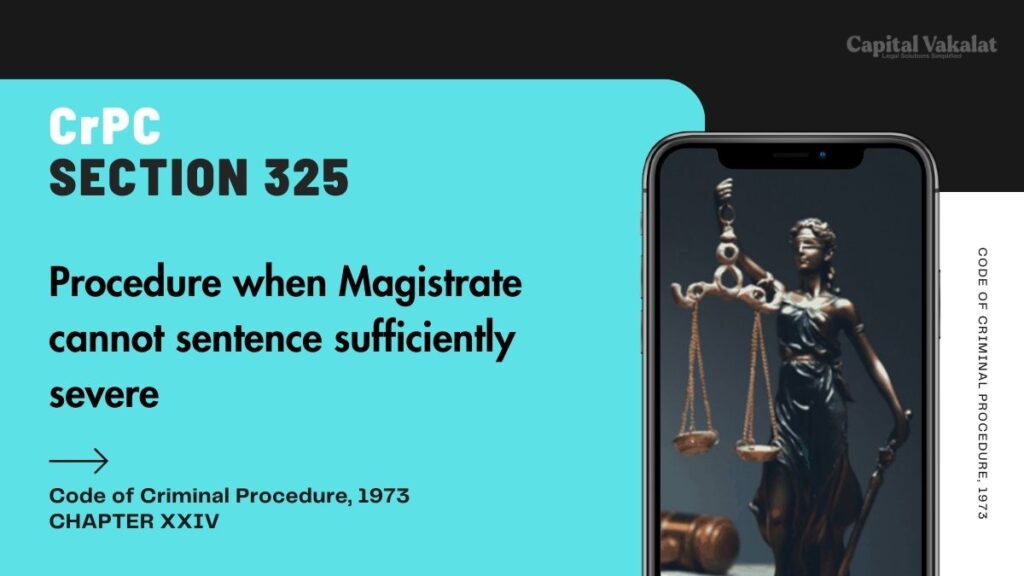The Criminal Procedure Code (CrPC) of India is a vital legal document governing the administration of criminal law in India. One of its important sections, Section 325, deals with the procedure when a magistrate cannot impose a sufficiently severe sentence.

This article provides an in-depth understanding of Section 325 CrPC, explaining its relevance, procedural details, and implications for the justice system.
Bare Act. Section 325 Cr.P.C.
Procedure when Magistrate cannot pass sentence sufficiently severe.
(1) Whenever a Magistrate is of opinion, after hearing the evidence for the prosecution and the accused, that the accused is guilty, and that he ought to receive a punishment different in kind from, or more severe than, that which such Magistrate is empowered to inflict, or, being a Magistrate of the second class, is of opinion that the accused ought to be required to execute a bond under section 106, he may record the opinion and submit his proceedings, and forward the accused, to the Chief Judicial Magistrate to whom he is subordinate.
(2) When more accused than one are being tried together, and the Magistrate considers it necessary to proceed under sub-section (1), in regard to any of such accused, he shall forward all the accused, who are in his opinion guilty, to the Chief Judicial Magistrate.
(3) The Chief Judicial Magistrate to whom the proceedings are submitted may, if he thinks fit, examine the parties and recall and examine any witness who has already given evidence in the case and may call for and take any further evidence and shall pass such judgment, sentence or order in the case as he thinks fit, and is according to law.
Section 325 CrPC: Procedure When Magistrate Cannot Sentence Sufficiently Severe
Section 325 of the CrPC addresses situations where a magistrate, upon conviction, feels that the appropriate punishment exceeds their sentencing powers. This section ensures that justice is served adequately, even if it requires referring the case to a higher authority capable of imposing a more severe sentence.
The Scope and Importance of Section 325 CrPC
Section 325 CrPC plays a crucial role in maintaining the balance of judicial powers. It ensures that cases requiring more severe penalties than a magistrate can impose are handled appropriately, thus upholding the principles of justice. This section is significant as it prevents under-sentencing in serious cases, ensuring that offenders receive penalties commensurate with their crimes.
Magistrate’s Powers and Limitations
Magistrates in India have defined sentencing powers based on their rank and the type of court they preside over. For instance, a Chief Judicial Magistrate can impose more severe penalties compared to a First-Class Magistrate. However, when a magistrate encounters a case warranting a sentence beyond their powers, Section 325 CrPC comes into play.
Referral to a Higher Court: The Procedure
When a magistrate concludes that a case requires a harsher sentence than they can impose, they must refer the case to a Chief Judicial Magistrate or a Sessions Judge. The referral process involves:
- Documenting Reasons: The magistrate must record their reasons for believing a harsher sentence is necessary.
- Forwarding Case Records: All relevant case documents, evidence, and records must be forwarded to the higher court.
- Notification to the Accused: The accused must be informed about the referral and the reasons behind it.
Role of the Chief Judicial Magistrate and Sessions Judge
Upon receiving a referral under Section 325 CrPC, the Chief Judicial Magistrate or Sessions Judge reviews the case. They can either proceed with the trial or, if they find the initial magistrate’s reasons valid, impose a more severe sentence. This process ensures that justice is neither delayed nor denied due to jurisdictional limitations.
Legal Implications for the Accused
For the accused, a referral under Section 325 CrPC can have significant implications. It means that they may face a more severe sentence than initially anticipated. This possibility underscores the importance of robust legal defense and the need for the accused to be well-prepared for proceedings in a higher court.
Ensuring Fairness in Sentencing
Section 325 CrPC serves as a safeguard to ensure fairness in sentencing. It prevents the miscarriage of justice that could occur if a magistrate were forced to impose a lesser sentence due to jurisdictional constraints. By allowing referrals to higher courts, the CrPC ensures that punishments are appropriate and just.
Challenges and Criticisms
While Section 325 CrPC is pivotal in ensuring appropriate sentencing, it is not without its challenges and criticisms. Some argue that the referral process can lead to delays in the judicial process. Others contend that it may place undue stress on higher courts, already burdened with numerous cases.
Case Studies: Practical Application of Section 325 CrPC
Examining real-world cases where Section 325 CrPC has been applied can provide valuable insights into its practical implications. For instance, in cases involving serious offenses like grievous hurt or repeat offenders, magistrates often refer cases to higher courts to ensure suitable sentencing.
Impact on Judicial Efficiency
The referral process under Section 325 CrPC, while essential for just sentencing, can impact judicial efficiency. Higher courts must allocate time and resources to review referred cases, which could otherwise be used for other pressing matters. Balancing the need for severe sentencing with judicial efficiency is a continual challenge.
Conclusion
Section 325 CrPC is a cornerstone of the Indian judicial system, ensuring that offenders receive appropriate sentences even when a magistrate’s powers are limited. By facilitating referrals to higher courts, it upholds the principles of justice and fairness. However, the process also underscores the importance of judicial efficiency and the need for continuous evaluation of legal procedures.